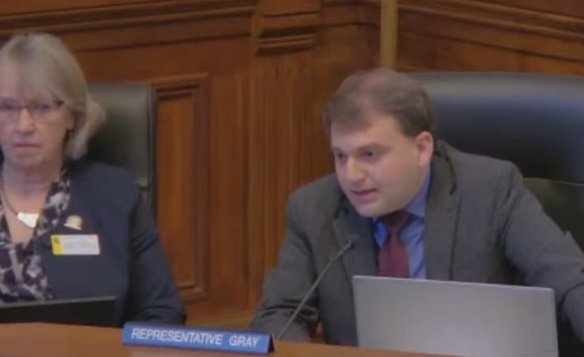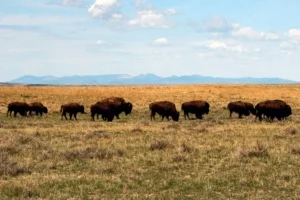Legislative Leaders Seek to Boost Lawmaker Compensation
Proposed bills would provide more money for expenses, add health insurance
- Published In: Politics
- Last Updated: Dec 03, 2022

As state Rep. Cathy Connolly (D-Laramie) listens at left, Rep. Chuck Gray (R-Casper) speaks against a bill that would create an independent commission to advise the Legislature on appropriate salaries for state officials, lawmakers and judges. (Courtesy image from the Wyoming Legislature)
By CJ Baker
Special to the Wyoming Truth
Leaders of the Wyoming Legislature are recommending that the state provide better pay and benefits to lawmakers, hoping to ensure that a broad range of people are able to serve as senators and representatives.
The Legislature’s Management Council previously voted to sponsor bills that would increase the amount of money lawmakers receive for expenses, and on Thursday, the committee backed another measure that would allow them to receive health insurance.

“… it’s an uphill battle to pass something like this, because we have a legislature that is deeply divisive and political when it comes to compensation” and that doesn’t see a need for change, said Sen. Chris Rothfuss (D-Laramie).
“But this is empowering,” Rothfuss said of offering health insurance. “If we were to pass this legislation, I think we would open the door to a lot of folks in Wyoming that previously couldn’t serve or … wouldn’t even run for office.”
The average Wyoming legislator collected a salary of not quite $13,200 per year during the 2017-2018 biennium, according to data compiled over the summer by the Legislative Service Office. Although it’s a citizen Legislature, the position can involve long hours during the annual sessions and a growing workload of interim committee meetings throughout the year. Senate President Dan Dockstader (R-Afton) described it as a job that “consumes my life.”
While there are some additional benefits, the bulk of lawmakers’ compensation comes from the salary of $150 per day plus a per diem of $109 for expenses, paid each day lawmakers are in session or attending committee meetings. Legislators also receive $3,000 per year to help cover expenses related to serving their constituents, such as the costs of traveling to meetings around their district.
In October, the Management Council opted to sponsor bills that would bump the per diem to $150 and the annual constituent service allowance to $4,000. On Thursday, the outgoing House and Senate leaders who make up the council rejected a proposal to raise the salary to $230 per day in 2027 by a 3-3 margin, but advanced a bill that would add health insurance coverage on a 5-3 vote.
Rothfuss described the current lack of insurance benefits as one of the largest barriers for people looking to serve in the legislature, and adding coverage is the costliest change under consideration.
The measure advanced Thursday would enable lawmakers to join the state’s insurance plan, with roughly 82% of their monthly premiums picked up by taxpayers (though the percentage would vary based on the plan selected by the legislator). The Legislative Service Office (LSO) estimated that the state would pay an average of $17,225 per lawmaker under 2023 rates, with lawmakers paying another $3,781. Assuming 30% of the state’s 93 legislators enrolled, that would require $482,300 of tax dollars annually, the LSO noted, while 90% participation would cost upwards of $1.4 million..
Rep. Chuck Gray (R-Casper), who will become Wyoming Secretary of State next month, was among those who opposed offering the health insurance.
“I just think this is way, way too far,” Gray said.

Incoming Speaker of the House Rep. Albert Sommers (R-Pinedale) also voted no on the bill, though he said he’d support a different version, in which lawmakers pay 100% of the state premiums.
Risking “harsh political fallout”
However, getting any version of the compensation bills through the full Legislature could be more challenging.
Sen. Tara Nethercott (R-Cheyenne), noted the blowback she received after voting in the 2022 Budget Session to raise the pay for the governor, secretary of state, treasurer, auditor and superintendent of public instruction. Nethercott referenced that criticism when she joined a 6-2 vote to sponsor a bill to create an independent commission on state officials’ compensation.
“I do have concerns about the ability of the Legislature to actually do their constitutional duties [in setting pay], because of the harsh political fallout associated with making those appropriate decisions. So I appreciate the need for a commission,” Nethercott said.
The seven-member commission — appointed by the governor, Senate president, speaker of the House and chief justice of the Wyoming Supreme Court — would hold no power, but make recommendations to the Legislature about compensation for lawmakers, the five statewide elected officials and state judges.
State Court Administrator Elisa Butler said the commission’s review of salary data from the private sector could help retain and recruit qualified judges. She also welcomed the idea of annual reviews, as currently “the judges and justices basically get really far behind other states and then we come and ask for a salary increase.”
Gray voted against the commission bill. He took no issue with a panel reviewing judicial salaries, but argued the Wyoming Constitution gives lawmakers the sole responsibility of setting wages for the elected officials.
“I just don’t think it’s good to delegate that authority in any way,” he said. Gray added that it wasn’t the right time to revisit the salaries of the five statewide officials, as “we just did a huge increase on those.”
When Nethercott unsuccessfully ran against Gray for secretary of state in August’s primary election, his campaign committee attacked her for supporting the roughly 37% salary increases, describing Nethercott’s vote to raise the pay for the secretary of state as a “$30,000 taxpayer-funded pay raise for herself.”
Nethercott appeared to sarcastically shoot back at Gray on Thursday when she joined him in voting against the proposed salary hike for lawmakers.
“I believe I’ve already voted to give myself a pay raise, though I’m a no as well,” she said.
Later in the meeting, Nethercott said she worried that the proposed compensation commission is “not enough,” given the pressure lawmakers face when hiking pay. However, she said she thinks it “helps move the needle to provide justification for those legislators who have the courage to make those votes.”
The full Legislature will vote on the Management Council’s proposals when it convenes for the 2023 General Session, beginning Jan. 10.













